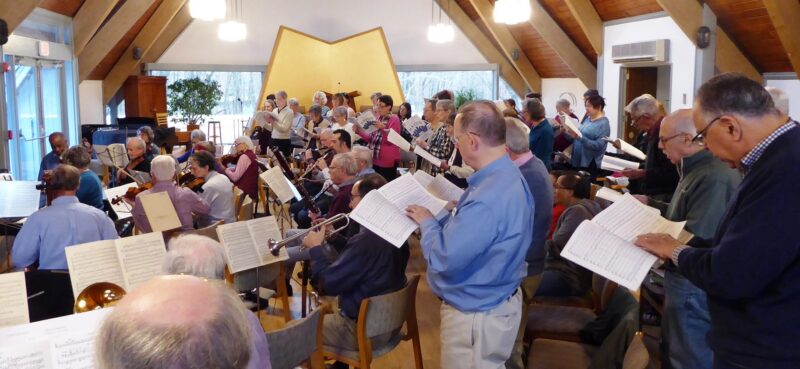Princeton Society of Musical Amateurs Celebrates 90th Anniversary This Season
FOR THE JOY OF SINGING: Members of the Princeton Society of Musical Amateurs gather each month to sing choral works under the batons of area conductors. There are no rehearsals or auditions, and all are welcome to sing or just listen.
By Anne Levin
At its founding in 1935, the Princeton Society of Musical Amateurs (PSMA) was a small club, hosted by Princeton University’s Music Department. At informal Sunday afternoon meetings, about 20 people gathered to sing selections of choral literature. Accompaniment was by a single pianist.
These days, the PSMA boasts 266 members. An invited orchestra accompanies most works, which span the choral repertoire to include requiem masses by Brahms, Mozart, and Faure; Handel’s Messiah; and Bach’s Christmas Oratorio, to name a few. Guest conductors from local choruses and choirs lead each gathering. A programming committee plans each season.
The goal of the PSMA, which holds its first session of the season on October 20, has always remained the same: To celebrate the joy of singing. Anyone can join — either to sing or just to listen — at its monthly meetings at the Unitarian Universalist Congregation of Princeton. There are no rehearsals or auditions.
“Singing is a joy,” said Marilee Thompson, president of the organization and a member since 1970. “I can be having a totally rotten day, and then I go to this and come home invigorated. Singing just makes you feel good. It’s for the joy of singing. It’s joyful.”
The positive effects of singing with others are well known.
“The satisfaction of performing together, even without an audience, is likely to be associated with activation of the brain’s reward system, including the dopamine pathway, which keeps people coming back for more,” reads a research report from the University of Oxford. Another report, led by psychologist Nick Stewart of Bath University, “indicates that people who participate in a choir enjoy a greater feeling of togetherness and being part of a collective endeavor than others involved in different social activities.”
Karen Jenkins, a cellist with the PSMA’s orchestra and a member of the board, said in a press release, “Sometimes, we’re just sight-reading. But it also feels like a jam session, because we’re all just playing and singing. It’s very low-stress and lots of fun. I love that. There’s nothing like being immersed in Handel’s Messiah with a full chorus and orchestra all around you. I feel very connected to the experience, and everyone is just there to play, sing, and have a good time. It’s magical.”
According to the PSMA’s website, the organization was modeled after Henry Drinker’s Sunday night singing parties in Philadelphia. Members met in the living room of Mrs. MacKenty Bryan’s house, but after World War II moved to the old Miss Fine’s School building (present site of Monument Hall) with Mrs. Bryan as manager.
“She served a magnificent supper at intermission time,” reads the website. “The popularity and subsequent growth of the organization led to the use of the “new” gymnasium of the school, built around 1955, where there was enough room to house the current membership of that time — 175 or so — and experiment with having orchestral accompaniment. Certain traditions evolved, such as singing either Handel’s Messiah or the Bach Christmas Oratorio in December – and the Bach Mass in B-minor in May. The sessions were generally conducted by J. Merrill Knapp or Elliot Forbes, who were both members of the University’s Music Department, with an occasional guest conductor being introduced. Eventually Mrs. Bryan’s glorious suppers had to be reduced to “refreshments” because of rising food costs and the tremendous labor involved.”
On October 20, Nicole Aldrich will conduct Faure’s Requiem and Vivaldi’s Gloria. Works by Bach, Gilbert and Sullivan, Carl Orff, Verdi, Mendelssohn, and as always, Handel’s Messiah, are on the schedule for this season.
“We had been talking about doing something special for our 90th year,” said Thompson. “We polled our people, asking them to name their favorite pieces and favorite conductors. So that guided us in coming up with the list. We weren’t able to get all of our favorites, but we got most.”
While anyone is welcome to attend the monthly sessions, and there is a special section set aside for those who only want to listen, many of the members have had some experience. “The ones who come to sing are, in general, people who sing in a church choir or chorus,” said Thompson. “Or maybe they sang in college. You either have to have learned a piece before, or know how to read music, to be able to participate.”
What makes the PSMA unique is its orchestra. All volunteers, players come from the Westminster Community Orchestra and elsewhere. The organization has also earned a reputation with area conductors.
“Some of them say this is the only thing they would volunteer for,” said Thompson. “We’re really very fortunate that they are willing to do this. But it does work for some of them, because it might serve as an extra rehearsal for something they are working on with their own groups.”
In addition to the standard choral pieces, the PSMA tries to include some that are less familiar each season. The most popular works draw up to 60 singers at a session. The lesser-known pieces bring in 30 to 40 participants. The January session is always a semi-staged Gilbert and Sullivan operetta, complete with costumed soloists from a local Gilbert and Sullivan society. This season’s selection is Iolanthe.
The October 20 gathering is at 4 p.m. For more information, visit musicalamateurs.org.


